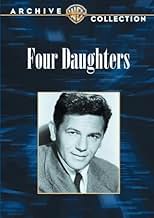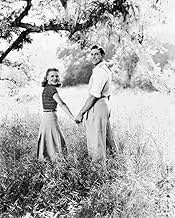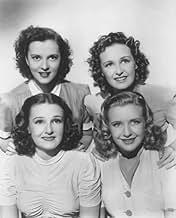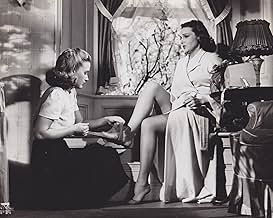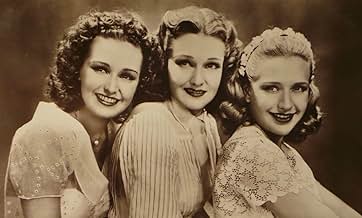Ajouter une intrigue dans votre langueA musician is blessed with four musical prodigies, all girls, and cursed when a troubled young composer enters the lives of his daughters.A musician is blessed with four musical prodigies, all girls, and cursed when a troubled young composer enters the lives of his daughters.A musician is blessed with four musical prodigies, all girls, and cursed when a troubled young composer enters the lives of his daughters.
- Réalisation
- Scénario
- Casting principal
- Nommé pour 5 Oscars
- 5 victoires et 7 nominations au total
- Waiter
- (non crédité)
- Mrs. Ridgefield's friend
- (non crédité)
- Doctor
- (non crédité)
- Man
- (non crédité)
Avis à la une
Often I'll run across a film I didn't expect to amount to much and be pleasantly surprised, and this is one of them. Then I see the director is Michael Curtiz who was saddled with directing such diverse films - and quite frankly challenged plots and actors - during his Warner Brothers career, and some of the mystery is unraveled.
The film is about the family of Adam Lemp (Claude Rains), Dean of the Briarwood Music Foundation (nice work if you can get it during the Depression), who apparently makes so much money that he can afford a house that would go for half a million these days, can support four grown daughters, and his sister who never married (May Robson as Aunt Etta). In fact Rains is thirty years younger than Robson, so that would be some age difference for siblings, and what is an esteemed music foundation doing out in Pleasantville, USA?...but I digress.
So the film goes into the relationship between the four sisters - actually three of them ARE sisters - in particular, Emma (Gail Page) and Ann (Priscilla Lane). They vow to be "old maids" together and seem to have a very strong bond. But then enters upbeat composer Felix Deitz (Jeffrey Lynn) into their lives, along with his downbeat friend Mickey Borden (John Garfield), who is doing orchestration for him. That impossible thing we are expected to believe? That Ann falls head over heals for Lynn's character when he projects all of the romantic appeal of a workboot. She seems to feel like Mickey is a work in progress as she tries to lift his IMHO justified downbeat view on life, particularly, his life. So I am expected to believe a vibrant young woman would prefer Lynn's scarecrow like demeanor over the dark brooding Garfield? Well, this was Garfield's first film, so who knew what kind of charisma he would have.
Mickey falls for Ann, Emma falls for Felix (again, why??), and then on the day of her wedding to Felix, Ann finds out Emma loves Felix. Complications ensue.
This film is saved by some really good warm moments between the characters, and Robson always entertains, although it does waste the talents of one of the great actors of the 20th century, Claude Rains. Anybody could have played this part as little as he has to do. It does give you an idea of the kind of burden women had before the 1970s - that it was only acceptable to first live with your parents and then a husband, and if you never married you are forever fifth wheel and housekeeper in your brother's household, and if you temporarily have a career it has to be in something "lady like". How would this film have turned out if the girls had wanted to put on a hard hat and design buildings rather than sing and play instruments? You'll have to wait until the 1970s for THAT kind of film!
Recommended and well acted in spite of it all. And why are the top three billed actors in a film entitled "Four Daughters" all men? Inquiring minds want to know.
Very entertaining movie was a big hit and nominated for five Academy Awards. It's beautifully directed by Michael Curitz, has a pretty good (if predictable) script and a VERY attractive cast (especially Lynn). Also this was John Garfield's first film and made him a star. This was so popular there were three or four sequels (which I never saw). This is an engrossing, entertaining, big budget soap opera--well worth seeing.
*** 1/2 (out of 4)
A musician and father (Claude Rains) does his best to raise his four daughters (Priscilla Lane, Rosemary Lane, Lola Lane, Gale Page) the right way, which he does but things start to go wrong when a rebel musician (John Garfield) enters their house. I was surprised to see how much I enjoyed this film because I was really just expecting a lot of melodrama and sappy scenes but the film became much more than that due to Curtiz's tight direction of the material and a terrific performance by Garfield. The story is certainly mainly for women but Rains and Garfield both make it more entertaining for the men and both of them also give a lot of backbone to the story. Rains is terrific as the old-fashioned father and the four women are also very strong with Priscilla being the real stand out. The supporting cast includes May Robson, Jeffrey Lynn and Dick Foran and all of them are very good. It's easy to see why Garfield received an Oscar nomination and jumped to stardom after this one role because it's one of the most memorable performances from this late 30s period. Garfield brought along a new style of acting and it's still quite refreshing seeing it where it started.
Why national critics loved this movie was the presence of bad-boy-rebel John Garfield. In their twisted Liberal-dominated minds, All-American characters are sickening but sour-on- life, poor-attitude types like Garfield played here are people they can identify with. Despite that, this movie still has an overall feeling of goodness, which is why I liked it. Some of the characters may have done stupid things, but they good hearts. Whose heart was bigger than "Ann's" (Priscilla Lane) in here? I agree with the IMDb user comments critic in here who says this is Priscilla's film as much as the beloved (not by me) Garfield's.
With a director the caliber of Michael Curtiz, the film is better than it might have been under someone else. Curtiz made sure no scene, soapy or otherwise, went on too long.
In addition to the Lane sisters and Garfield, we have Claude Rains (who adds much-needed humor to the story), Jeffrey Lynn (the main love interest of the girls), Gale Page, Dick Foran, Frank McHugh and Mae Robson.
Apparently, this movie must have been a hit because there were several spin-offs from it, neither of them approaching this one in content and box-office success.
Though Garfield is the main reason to watch "Four Daughters," there are other flashes of brilliance to enjoy. Hungarian-born director Michael Curtiz, later responsible for such gems as "Casablanca" and "Mildred Pierce," pinpoints certain images with his camera (aided by cinematographer Ernest Haller of "Rebel Without A Cause" fame) that sticks in the viewers mind, for example the screeching gate that Ann's first suitor, Felix Deitz (Jeffrey Lynn), swings on so merrily becomes symbolic of the shifts in moods and affections by those who use it.
That Garfield delivers the standout performance is obvious, but the rest of the cast keeps up with him most of the way. The underrated Jeffrey Lynn plays his role to perfection, as the neglected suitor whose love for his cherished Ann never falters even when she's with another man. Claude Rains, somewhat miscast as the father of the four coming-of-age young women, gives a fine portrayal of a set upon doting family head who gets lost in the shuffle. The three Lane Sisters, already famous for their musical abilities, turn into accomplished actresses, playing their parts well. A raft of supporting actors, including Dick Foran, Frank McHugh, May Robson, and Eddie Acuff, makes it all believable.
How opposites attract is part of the ploy for touching the quick of the viewer's imagination. Ann is the eternal optimist, even when she and Mickey are down and out. She always looks on the bright side and like so many caught in the pliers of the Great Depression in those days, she saw prosperity just around the corner. Mickey recites an entire list of bad things that have happened to him seeking company in his misery from Ann, which Ann refuses to do. Mickey expects to go out with a bolt of lightning striking him dead as he rounds the corner of life. Mickey has meager talent as a composer; Ann has talent to spare as a singer and musician. Ann is big on beauty; Mickey is big on personality in a warped sense of a way. And the differences go on and on. How all this is reconciled in the end is an important part of the movie, not to be missed.
See "Four Daughters" for John Garfield's doozy of an acting debut on the big screen. The only time he was better came seven years later when he again mesmerized the film goers with one of the greatest screen performances ever, as Frank Chambers in "The Postman Always Rings Twice," opposite the equally charismatic Lana Turner. But also watch "Four Daughters" to catch important elements that may be missed if too much concentration is placed on the star of the show.
Le saviez-vous
- AnecdotesThis movie was John Garfield's first film and earned him his first Oscar nomination for Best Supporting Actor. He would receive one other Oscar nomination for Best Actor in "Body and Soul" (1947).
- Citations
Mickey Borden: I wouldn't win first prize if I were the only entry in the contest.
Ann Lemp: Mathematically speaking, I think you'd stand a fine chance.
Mickey Borden: You think they'd let me win?
Ann Lemp: Who?
Mickey Borden: They.
Ann Lemp: Who?
Mickey Borden: The fates, the destinies, whoever they are that decide what we do or don't get.
Ann Lemp: What do you mean?
Mickey Borden: They've been at me now nearly a quarter of a century. No let-up. First they said, "Let him do without parents. He'll get along." Then they decided, "He doesn't need any education. That's for sissies." Then right at the beginning, they tossed a coin. "Heads he's poor, tails he's rich." So they tossed a coin... with two heads. Then, for a finale, they got together on talent. "Sure," they said, "let him have talent. Not enough to let him do anything on his own, anything good or great. Just enough to let him help other people. It's all he deserves." Well, you put all this together and you get Michael Bolgar.
- ConnexionsFeatured in Hollywood: The Great Stars (1963)
Meilleurs choix
- How long is Four Daughters?Alimenté par Alexa
Détails
- Date de sortie
- Pays d’origine
- Langues
- Aussi connu sous le nom de
- Four Daughters
- Lieux de tournage
- Sociétés de production
- Voir plus de crédits d'entreprise sur IMDbPro
- Durée
- 1h 30min(90 min)
- Couleur
- Mixage
- Rapport de forme
- 1.37 : 1



